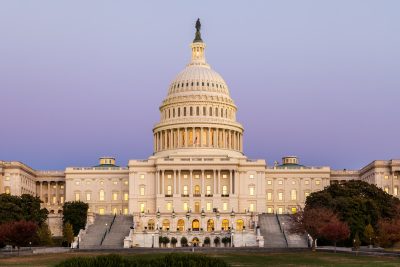Immigration Reform
The last time Congress updated our legal immigration system was November 1990, one month before the World Wide Web went online. We are long overdue for comprehensive immigration reform.
Through immigration reform, we can provide noncitizens with a system of justice that provides due process of law and a meaningful opportunity to be heard. Because it can be a contentious and wide-ranging issue, we aim to provide advocates with facts and work to move bipartisan solutions forward. Read more about topics like legalization for undocumented immigrants and border security below.
Not All States Target Immigrants or the Slightly Suntanned
Despite the commotion around Arizona’s SB 1070, a recent report shows that more laws expanding immigrants’ rights are being enacted than those contracting them. The Wilson Center’s study, Context Matters: Latino Immigrant Civic Engagement in Nine U.S. Cities, found that in 2007, 19 percent of 313 bills expanding immigrant rights were enacted and only 11 percent of 263 bills contracting rights were enacted by state legislatures. Washington, for example, passed SB 6403, which seeks to improve high school graduation rates by serving vulnerable youth, including recent immigrants. Andrew Selee of the Woodrow Wilson Center concluded that “most cities and counties are trying to figure out how they can best incorporate these immigrants,” many of whom are a “productive part of society,” rather than target them for deportation. Read More

Republican Obstructionism on the Path to Immigration Reform
In an interview on Univision over the weekend, Senator Harry Reid (D-NV) spoke about the path forward for comprehensive immigration reform (CIR)—in particular, the need for Republican support and its notable absence. Senator Reid called attention to the fact that Arizona’s recent immigration law is a reaction to the lack of federal oversight on the issue—yet when push comes to shove, Arizona’s senators refuse to work with Democrats on a reform bill. Like many Republicans, Arizona Senators McCain and Kyl are hiding behind the “secure our borders first” line—a tired strategy that has only exacerbated the myriad of other problems within our broken immigration system. Although the enforcement-first sound bite may play well with Arizona voters today, the failure to find bipartisan solutions on immigration will continue to have negative long-term consequences. Will voters—especially Latino voters—support the Republican Party if its leaders are perceived as uniformly obstructionist on immigration reform? Will the “Party of No” become the “Party of No One” come election day? Read More

‘Fox & Friends’ Trumpets Farcical Claim About Murders by Unauthorized Immigrants
The infotainment show Fox & Friends recently trumpeted the absurd and baseless claim that unauthorized immigrants kill 2,158 people in the United States each year. However, as Media Matters describes in detail, this random number is based on a 2005 article in the right-wing journal Human Events that uses a methodology no serious researcher could possibly endorse. The author of that article derived his “estimate” by assuming that unauthorized immigrants in the United States commit murders at exactly the same rates as the murder rates in their respective home countries. So unauthorized Mexicans are assumed to mimic the Mexican murder rate once they get here, unauthorized Salvadorans are assumed to mimic the Salvadoran murder rate, etc. As if this weren’t ludicrous enough, the author throws in an inflammatory and irrelevant comparison with the U.S. death toll in Iraq. In fact, empirical research over the past century has demonstrated repeatedly that immigrants to the United States, including the unauthorized, are far less likely to commit serious crimes or be behind bars than the native-born. And no amount of grandstanding by Fox and Friends will change that simple fact. Read More

“Suiting Up” Against the Constitutionality of Arizona’s Enforcement Law
Before Arizona Governor Jan Brewer ever put pen to paper to sign SB 1070, immigration rights advocates were preparing challenges to the law. Various members of the administration have hinted that the Arizona law may face a federal challenge—Attorney General Eric Holder stated that the Department of Justice is reviewing the law for a possible suit, and DHS Secretary Janet Napolitano echoed this in a hearing last week, stating that she had “deep concerns” with the law. Even President Obama has admitted that the law threatens to “undermine the basic notions of fairness.” Read More

President Obama’s Moment to Reassert Federal Leadership on Immigration Reform
Washington, D.C. – Tomorrow, Thursday, July 1st, President Obama will make what is being described by the New York Times as “a major speech on immigration” at American University in Washington, D.C. The President is expected to step forward to reassert the leadership of the Federal Government on the… Read More

A Race to the Bottom: The Best of the Worst in Recent Anti-Immigrant Proposals
Just when you think you’ve heard it all—someone, somewhere, sets the bar even lower. It’s not an overstatement to say that the immigration debate is ripe with contention. It inspires commentary from a wide range of political spectra—from the libertarian no-border folks to the “don’t retreat, reload” tea partiers. But regardless of political leaning, nearly all groups agree that immigration is a problem that needs to be fixed, albeit with an even wider range of solutions. However, right and left aside, there are people who want to take the immigration debate in yet another direction—downward. Against the backdrop of Arizona’s harsh enforcement law, there have been a slew of anti-immigrant aftershocks posing as solutions to our immigration problems—aftershocks that are as ludicrous as they are alarming. And for the record, this is the part of ILLEGAL that people don’t understand. Read More

Forward March: Hundreds of Thousands Took to the Streets Demanding Immigration Reform
Sparked by Arizona’s anti-immigration enforcement law, hundreds of thousands of protesters took to the streets on Saturday to demand congressional action on immigration reform. Carrying signs that read “Do I Look Illegal?” and “We are All Arizona,” labor, student, civil rights and immigration activists gathered in more than 70 cities nationwide (including Washington, D.C., Los Angeles, Dallas, Chicago, Milwaukee and San Francisco) with one united message—we need immigration reform now. Read More

Real Enforcement with Practical Answers for Immigration Reform (REPAIR) Proposal Summary
On April 29, 2010, Democratic Senators Schumer, Reid, Menendez, Feinstein, and Leahy unveiled a proposed outline for a comprehensive immigration reform bill. The “conceptual framework” offers a broad platform for re-inventing our immigration system and attempts to find a middle ground that may appeal to more conservative Democrats and moderate Republicans. Consequently, details are noticeably lacking in many areas of the proposal. Nonetheless, the underlying concept reflects a more comprehensive approach to immigration reform which attempts to balance traditional enforcement priorities with the creation of legal means for entering and working in the United States. Read More

Repairing Immigration
Yesterday’s release of the framework for an immigration bill—Real Enforcement and Practical Answers for Immigration Reform (REPAIR) has been praised as a positive step forward in the immigration debate by the President and dismissed as a cynical play for votes by Senators Graham and Kyl. They are aghast that immigration is moving because promoting it might garner Democrats votes in November. Is there really any piece of legislation that isn’t motivated, in whole or in part, by the political calculation? So, let’s just put to rest the idea that the Senators who stood up for immigration reform yesterday—Reid, Durbin, Schumer, Menendez, Feinstein, and Leahy--- have a political motive. Of course they do. And just to be fair, Senators Kyl and Graham and McCain, in promoting a border first strategy, are equally motivated by pleasing real or imagined voters. Read More

Digging Immigration Out of Midterm Election Politics
The world of immigration reform can seem, at times, a lot like being stuck in an avalanche—it’s difficult to know which way is up. The closer we get to midterm elections, the more political drift and white noise we have to dig through to discern whether immigration reform is actually going to see the light of day. Senator Lindsey Graham (R-SC), the lone Republican co-sponsoring a forthcoming immigration bill with Senator Chuck Schumer (D-NY), buried his head in the snow this week when he threatened to walk away from his own climate bill if immigration legislation moves forward this year. Meanwhile, Arizona’s new immigration enforcement law—which continues to draw national attention—has united Senate Democrats (and a few GOPers) to speak out against the law and provided the political momentum for some Democrats to forge ahead on a comprehensive reform outline. The President, for his part, remains supportive of the forward movement, but is also looking to engage in a more serious, bipartisan discussion on reform. Read More
Make a contribution
Make a direct impact on the lives of immigrants.
